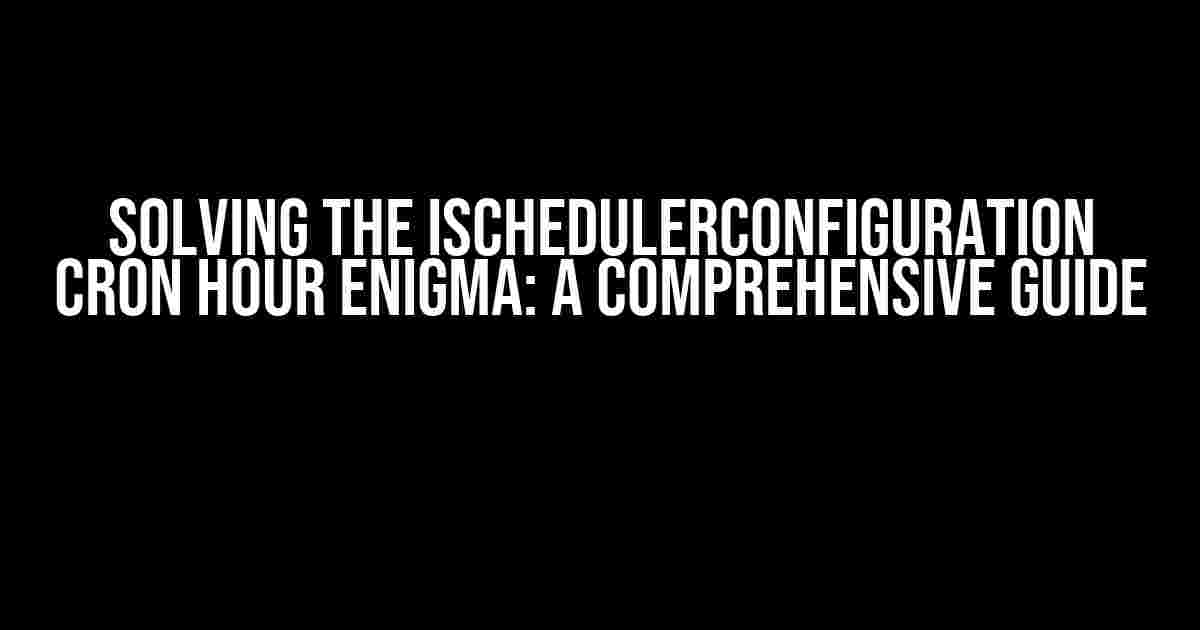If you’re reading this article, chances are you’re struggling to get your ISchedulerConfiguration Cron hour to work as expected. Don’t worry, you’re not alone! Many developers have faced this issue, and it’s time to put an end to the frustration. In this article, we’ll delve into the world of Quartz.NET and ISchedulerConfiguration, exploring the common pitfalls and providing actionable solutions to get your Cron hour up and running in no time.
Understanding ISchedulerConfiguration and Quartz.NET
Before we dive into the nitty-gritty of Cron hour configuration, let’s take a step back and understand the basics of ISchedulerConfiguration and Quartz.NET.
ISchedulerConfiguration is an interface in Quartz.NET that allows you to configure the scheduler, including setting up jobs, triggers, and calendar systems. Quartz.NET, on the other hand, is a popular open-source job scheduling system for .NET that provides a robust and flexible way to schedule and execute jobs.
Cron Expressions: The Heart of Quartz.NET
Cron expressions are the backbone of Quartz.NET’s scheduling mechanism. They’re used to define the schedule of a job, specifying when and how often the job should be executed. A typical Cron expression consists of five or six fields, separated by spaces:
-minute (0-59) -hour (0-23) -day of the month (1-31) -month (1-12) -day of the week (0-6 or SUN-SAT) -year (optional, 1970-2099)
In the context of ISchedulerConfiguration, we’ll focus on using Cron expressions to schedule jobs.
Troubleshooting ISchedulerConfiguration Cron Hour Issues
Now that we have a solid understanding of the basics, let’s explore the common issues that can prevent your ISchedulerConfiguration Cron hour from working as expected.
Incorrect Cron Expression Syntax
The most common mistake is incorrect Cron expression syntax. A single mistake can render your Cron expression invalid, causing the scheduler to fail.
Here’s an example of an incorrect Cron expression:
0 0 12 * * * *
The error in this expression is the extra asterisk at the end. Corrected, the expression should look like this:
0 0 12 * * *
Always double-check your Cron expression syntax to avoid this mistake.
Time Zone Issues
Quartz.NET uses the system’s local time zone by default. If your system’s time zone is not set correctly, your Cron hour might not trigger as expected.
To avoid this issue, specify the time zone explicitly in your Cron expression:
0 0 12 * * * * America/New_York
This ensures that the scheduler uses the correct time zone, eliminating any potential issues.
Invalid Hour Value
When specifying the hour value in your Cron expression, ensure it’s within the correct range (0-23). Values outside this range will cause the scheduler to fail.
For example, the following Cron expression is invalid:
0 24 12 * * *
The corrected expression would be:
0 0 12 * * *
Conflicting Triggers
If you have multiple triggers with conflicting schedules, it can cause issues with your Cron hour. Ensure that your triggers don’t overlap or conflict with each other.
For example, if you have two triggers with the following Cron expressions:
0 0 12 * * * 0 0 12 * * *
The second trigger will override the first one, causing unpredictable behavior. Instead, use unique Cron expressions for each trigger.
Best Practices for ISchedulerConfiguration Cron Hour Configuration
To avoid common pitfalls and ensure your ISchedulerConfiguration Cron hour works flawlessly, follow these best practices:
-
Use a Cron expression generator tool to validate and test your expressions.
-
Specify the time zone explicitly in your Cron expression to avoid system time zone issues.
-
Use unique Cron expressions for each trigger to avoid conflicts.
-
Double-check your Cron expression syntax to avoid errors.
-
Test your scheduler in a development environment before deploying it to production.
Real-World Examples and Scenarios
Let’s explore some real-world examples and scenarios to illustrate how to configure ISchedulerConfiguration Cron hour effectively:
Example 1: Daily Job at 12 PM
Suppose you want to schedule a job to run daily at 12 PM. Your Cron expression would be:
0 0 12 * * *
This expression tells the scheduler to run the job at 12 PM (0 minutes, 0 seconds) every day (* wildcard).
Example 2: Weekly Job on Mondays at 8 AM
Let’s say you want to schedule a job to run every Monday at 8 AM. Your Cron expression would be:
0 0 8 * * 1
This expression tells the scheduler to run the job at 8 AM (0 minutes, 0 seconds) on Mondays (1 = Monday) every week (* wildcard).
Example 3: Monthly Job on the 15th at 10 PM
Suppose you want to schedule a job to run on the 15th of every month at 10 PM. Your Cron expression would be:
0 0 22 15 * *
This expression tells the scheduler to run the job at 10 PM (0 minutes, 0 seconds) on the 15th day of every month (* wildcard).
Conclusion
Configuring ISchedulerConfiguration Cron hour can be a daunting task, but by following the best practices and troubleshooting common issues, you’ll be well on your way to creating a robust and reliable scheduling system. Remember to double-check your Cron expression syntax, specify the time zone explicitly, and avoid conflicting triggers. With practice and patience, you’ll master the art of scheduling jobs with Quartz.NET and ISchedulerConfiguration.
| Common ISchedulerConfiguration Cron Hour Mistakes | Solution |
|---|---|
| Incorrect Cron expression syntax | Double-check syntax and use online Cron expression generators for validation |
| Time zone issues | Specify the time zone explicitly in the Cron expression |
| Invalid hour value | Ensure hour value is within the correct range (0-23) |
| Conflicting triggers | Use unique Cron expressions for each trigger and avoid overlaps |
By following the tips and best practices outlined in this article, you’ll be able to overcome common ISchedulerConfiguration Cron hour hurdles and create a scheduling system that meets your needs. Happy scheduling!
Frequently Asked Question
Stuck with ISchedulerConfiguration Cron hour not working as expected? Here are some answers to get you back on track!
Why is my ISchedulerConfiguration Cron hour not triggering at the expected time?
Check if you’ve correctly set the Cron expression. Make sure to specify the hour field correctly. For example, if you want to schedule a job at 2 AM, the Cron expression should be `0 0 2 * * *`. Also, double-check the timezone settings to ensure they match your system’s timezone.
Can I use a specific timezone in my ISchedulerConfiguration Cron expression?
Yes, you can! Use the `cron.timezone` property to specify the timezone. For example, if you want to use Eastern Standard Time (EST), set `cron.timezone=America/New_York`. This ensures your Cron expression is evaluated according to the specified timezone.
What if I want to schedule a job to run only on weekdays (Monday to Friday)?
Modify your Cron expression to include the day of the week field. For example, to schedule a job at 2 AM on weekdays, use `0 0 2 * * MON-FRI`. This ensures the job runs only on Mondays, Tuesdays, Wednesdays, Thursdays, and Fridays.
Can I test my ISchedulerConfiguration Cron expression before deploying it to production?
Absolutely! Use online Cron expression testers or tools like Crontab Guru or FreeCron to test and validate your Cron expressions. These tools allow you to enter your expression and see when the next execution times will be.
What if I still can’t get my ISchedulerConfiguration Cron hour working after trying the above tips?
Don’t worry! Check your system logs for any errors or warnings related to the scheduler. Also, review your implementation and configuration to ensure everything is set up correctly. If you’re still stuck, consider reaching out to the community or a developer forum for further assistance.


